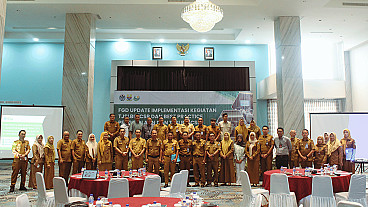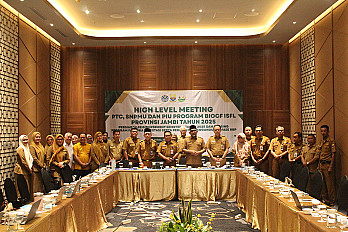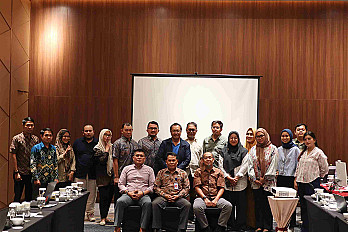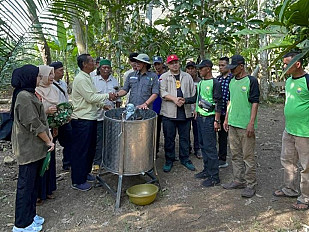Stories From the People
369
KUD Jaya Indah Bersama: Harvesting Sustainability from ISPO Certification
-detail.jpg)
Portal BIOCF
Tuesday, 05 August 2025 Post 12:08 AM
Renah Village, Bungo Regency – Amidst the verdant oil palm plantations of Limbur Lubuk Mengkoang District, a farmers' cooperative has become a symbol of sustainable agricultural transformation. The Jaya Indah Bersama Village Unit Cooperative (KUD), located in Renah Village, is now not only a gathering place for farmers but also a driving force for change through the implementation of ISPO (Indonesian Sustainable Palm Oil) certification.
With a total of 317 members, this cooperative has led 100 farmers into a new era of oil palm plantation management. They are part of a group of independent farmers who have now obtained ISPO certification—a significant milestone that ensures their agricultural practices meet national sustainability standards.
Better Prices, Better Lives
ISPO certification isn't just about paperwork. Its tangible benefits are felt directly by farmers. Before certification, members of the Jaya Indah Bersama Cooperative (KUD) could only sell Fresh Fruit Bunches (FFB) to middlemen or collectors at lower self-help prices. Now, with certification, the cooperative has access to sell FFB to large corporate partners at the reference price set by the Plantation Office (Disbun) — a significant leap in increasing farmers' incomes.
The price difference between certified and non-certified palm oil can reach IDR 400 to IDR 500 per kilogram, a significant difference for smallholder farmers. With harvests every 15 to 20 days, and yields ranging from 3 to 7 tons per member, this price increase has a direct impact on the well-being of farming families.
A More Organized System
The palm oil collection process is now carried out in an organized manner. Each member deposits their harvest to the Jaya Indah Bersama Cooperative (KUD), which then manages its distribution to the Palm Oil Mill (PKS). Although an operational fee of IDR 85,000 is charged, this system is far more transparent and profitable than selling individually.
ISPO certification is valid for five years, but to maintain it, the cooperative is required to undergo annual audits. This process ensures that palm oil cultivation practices continue to adhere to sustainable principles, from environmental and social aspects to business management.
Challenges and Hopes
The cooperative chairman, in a brief interview, stated that the journey to certification was not always easy. "It takes time and guidance to change farmers' habits, especially regarding record-keeping and waste management," he said. However, he is optimistic that the number of certified members will continue to grow in the near future.
Now, KUD Jaya Indah Bersama is not only a place to gather and sell their harvest, but has become a symbol that smallholder palm oil farmers can thrive and be competitive—as long as they are given the right opportunities and guidance.
The story of KUD Jaya Indah Bersama is concrete evidence that ISPO certification is more than just a formality. It is a bridge to fairer, more environmentally friendly, and more profitable agriculture for farmers.
With a total of 317 members, this cooperative has led 100 farmers into a new era of oil palm plantation management. They are part of a group of independent farmers who have now obtained ISPO certification—a significant milestone that ensures their agricultural practices meet national sustainability standards.
Better Prices, Better Lives
ISPO certification isn't just about paperwork. Its tangible benefits are felt directly by farmers. Before certification, members of the Jaya Indah Bersama Cooperative (KUD) could only sell Fresh Fruit Bunches (FFB) to middlemen or collectors at lower self-help prices. Now, with certification, the cooperative has access to sell FFB to large corporate partners at the reference price set by the Plantation Office (Disbun) — a significant leap in increasing farmers' incomes.
The price difference between certified and non-certified palm oil can reach IDR 400 to IDR 500 per kilogram, a significant difference for smallholder farmers. With harvests every 15 to 20 days, and yields ranging from 3 to 7 tons per member, this price increase has a direct impact on the well-being of farming families.
A More Organized System
The palm oil collection process is now carried out in an organized manner. Each member deposits their harvest to the Jaya Indah Bersama Cooperative (KUD), which then manages its distribution to the Palm Oil Mill (PKS). Although an operational fee of IDR 85,000 is charged, this system is far more transparent and profitable than selling individually.
ISPO certification is valid for five years, but to maintain it, the cooperative is required to undergo annual audits. This process ensures that palm oil cultivation practices continue to adhere to sustainable principles, from environmental and social aspects to business management.
Challenges and Hopes
The cooperative chairman, in a brief interview, stated that the journey to certification was not always easy. "It takes time and guidance to change farmers' habits, especially regarding record-keeping and waste management," he said. However, he is optimistic that the number of certified members will continue to grow in the near future.
Now, KUD Jaya Indah Bersama is not only a place to gather and sell their harvest, but has become a symbol that smallholder palm oil farmers can thrive and be competitive—as long as they are given the right opportunities and guidance.
The story of KUD Jaya Indah Bersama is concrete evidence that ISPO certification is more than just a formality. It is a bridge to fairer, more environmentally friendly, and more profitable agriculture for farmers.



-thumb.jpg)


-thumb.jpg)
-thumb.jpg)